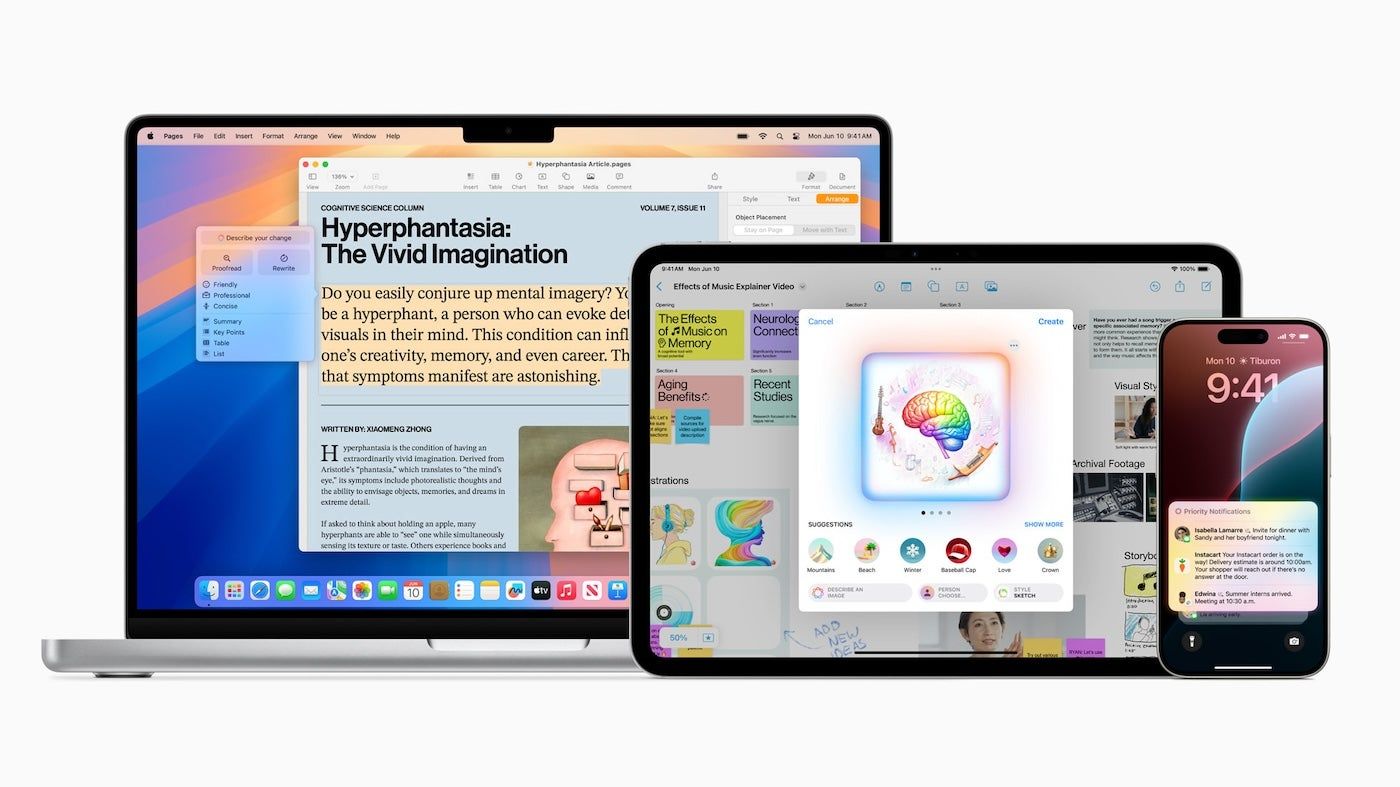Apple is bringing generative AI to Siri and throughout iOS 18, iPad OS 18, and MacOS Sequoia, the company announced at the Apple Worldwide Developers Conference on June 10.
As rumored, Apple is partnering with OpenAI to bring ChatGPT to iOS, iPadOS, and macOS. However, Apple Intelligence will be a standalone generative AI service hosted on its own servers.
Adding generative capabilities to Siri has the advantage of familiarity, and partnering with OpenAI means Apple won't have to do all the work itself. Apple is betting that generative AI will be a perfect addition to the way the Apple ecosystem may already be organizing the life of a consumer or professional.
Apple Intelligence will be available in beta this fall on iOS 18, iPadOS 18, and macOS Sequoia. It will work on iPhone 15 Pro, iPhone 15 Pro Max, and some current iPad and Mac devices with M1 or newer chips. ChatGPT support for Apple Intelligence is coming later in 2024.
Siri will respond to natural language
The popular voice assistant is catching up to the world of generative AI with Apple Intelligence, which allows Siri to:
- Understand questions and speech patterns that sound more natural, including understanding pauses or corrections, such as when you've forgotten exactly where you stored information.
- Remember previous conversations and references.
- Answer questions about Apple devices.
- Perform actions within applications on your behalf.
You can now type to speak to Siri, double-tapping the bottom of the screen to make natural language requests.
Apple didn't show flashy demos like OpenAI and Google did, but they may be betting on more consumers finding uses for generative AI through what they already do with Siri.
Improvements to Siri with Apple Intelligence will roll out over the next year.
Developers will be able to define how Siri with Apple Intelligence can interact with their applications.
What is Apple intelligence?
During the AI reveal at WWDC, Apple emphasized “personal intelligence” and privacy. Most of the generative AI processes used for Apple Intelligence will be performed on the device with A17 or M series chips and in a proprietary cloud.
Craig Federighi, Apple's senior vice president of Software Engineering, emphasized the personal context in his WWDC keynote.
“We're tremendously excited about the power of generative models…But these tools know very little about you and your needs,” he said.
In response, Apple Intelligence in iOS 18, iPad 18, and macOS Sequoia will use AI as “personal context” to streamline everyday tasks. iPhone can prioritize and summarize notifications with the “priority notifications” feature, selecting the most important ones first.
WATCH: Concerns over ultra-powerful artificial intelligence lead some within Silicon Valley to seek a “right to warn” for whistleblowers of AI projects.
What else does it mean to understand personal context? Apple Intelligence can determine what data it believes is most relevant and reference related content. For example, if your meeting is rescheduled, you can check if that will prevent you from making it to your daughter's event on time. This requires syncing your personal and work calendar, email, and maps.
New writing tools with generative AI will be available in Mail, Notes, Pages, Keynote and third-party applications. Apple Intelligence can also write and summarize emails.
Apple Intelligence can act between applications to perform tasks on your behalf. For example, you can ask her to take action based on natural questions like, “Play the podcast my wife sent the other day.”
Apple Intelligence allows consumers to easily create custom emojis in apps like Messages. Notes, Pages, Keynote and Freeform will get AI generative images. Apple's intelligence is able to identify and recreate images of people in your photo library, such as creating a picture of them for their birthday.
Private cloud computing
Sometimes Apple's AI processes will need to be performed on external servers. To avoid privacy and security issues related to this, Apple will run these processes in Private Cloud Compute, a home for Apple Intelligence that is still completely within the Apple ecosystem and uses Apple's own Swift programming language. Not even Apple can see that data, the company claims.
“You shouldn't have to hand over every detail of your life for someone to store and analyze in the AI cloud,” Federighi said.
ChatGPT will integrate with Siri
In addition to Apple Intelligence, Apple is partnering with OpenAI to bring ChatGPT and GPT-4o to Siri, which will be used to reference current information or collect information that is not on your devices.
Siri will ask for permission to communicate with ChatGPT. You can do this for free or connect to your personal ChatGPT subscription. This integration will arrive at the end of this year. Additionally, Apple plans to add support for other AI models.
Where Apple's AI fits into the competition
Apple has apparently chosen to stay out of the generative AI chatbot race for the past few years, although it did publish research on running large language models on mobile devices in December 2023. The relatively late entry means Apple has had time to observe the rest of the process. The industry is trying to find practical use cases for generative AI. Microsoft has also been seen changing its Recall AI feature from default to voluntary after security issues.
Will Apple face the same backlash and security as Microsoft's recall? And is Apple's ecosystem so powerful that its email digest and other Apple Intelligence capabilities will prove as revolutionary as AI companies predict AI generative content will be? Or is Apple playing it safe when it comes to AI and therefore discovering few benefits to business productivity other than saving a few minutes at a time? It's too early to tell, but time will tell if Apple Intelligence could be optional or transformative in the future.












